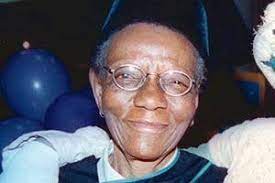
Chirambakusakara Mbuya – By ZimLegends
Article 13 of the United Nations convention on the rights of the child adopted on November 20, 1989 states that, the child shall have the right to freedom of expression; this right shall include freedom to seek, receive and impart information and ideas of all kinds, regardless of frontiers, either orally, in writing or in print, in the form of art, or through any other media of the child’s choice.
Among individuals who have stood out in fostering the rights of the child in fulfilment of provisions of article 13 was the late Miriam Mlambo, popularly known as Mbuya Chirambakusakara, a veteran broadcaster, who passed on at the age of 84, in 2008.
Mbuya Mlambo mastered the art of communicating with children, setting a level that might remain difficult to reach, for ages. In the presence of children Mbuya Mlambo would feel like a fish in water. Even as she was getting old she did not lose her exuberance in playing and mixing with children, just like one of them, hence her being named Mbuya Chirambakusakara (one who does not succumb to age). The term “Ambuya” means grandmother, a title she got as she became known as every child’s granny. This was primarily because in the midst of the laughing and joking, she educated children about good behaviour – like a grandmother would do in the olden days as part of the African culture.
Her performance on radio was so interactive and engrossing that her audiences could even read her body language by just listening without seeing her. Often you would find children in the townships singing, dancing, and laughing along with Mbuya in front of a radio as they listened to her distinctive voice.
Children would look forward to her programmes and the excitement could be seen from the flurry of calls to her phone-in discussion programmes with the kids. Even adults, especially house wives, would suspend their chores to join their children in the glorious moments with Mbuya Chirambakusakara.
There is no doubt that many primary adult caregivers who failed to develop their children’s communication skills at pre and primary school level, found solace in Mbuya Mlambo’s radio programmes.
Ambuya Mlambo was born in what was then known as Southern Rhodesia. She was raised in an orphanage run by Christian missionaries after the death of her mother which probably explains her affection for children. Her father took her to the orphanage at the age of five along with her younger sister.
Despite colonial injustices and growing up in the harsh conditions of an orphanage, she graduated with a teaching diploma. Ultimately she returned to school and received a diploma in nursing and served as a nurse and a midwife in her community.
She distinguished herself as one of the very few women of that time who would excel in education despite the challenges of the time. She began broadcasting children’s programs on a local channel of the Rhodesia Broadcasting Services in the late 1960s.
Her shows were both educational and entertaining. She would write children’s stories and read them on air… After independence, she began to broadcast her shows on TV. The children’s shows were either recorded in the studio with children from the community or were broadcast at schools. Her radio and TV shows included Farai Vana Vadiki, Potonjere, Look and Learn, Crystal Sweets Corner and Nguva Yevanavadiki. She would broadcast in both Shona and English. She also made appearances in several TV shows as an actress. Besides raising her own six children, she raised nearly eight other children in her household.
At the age of 76 she was honored with a Doctorate in Arts by the University of Zimbabwe. On July 16, 2007, Ambuya Mlambo, along with the Tumbuka Dance Company, opened the 50th anniversary of the National Gallery of Zimbabwe with a dance and act that focused on humility and tolerance.
She was married to John Mlambo who died in 1975 and the couple had six children. She resided in Harare’s congested Mbare High Density suburb till the time of her death. She had 16 grandchildren and six great-grandchildren.